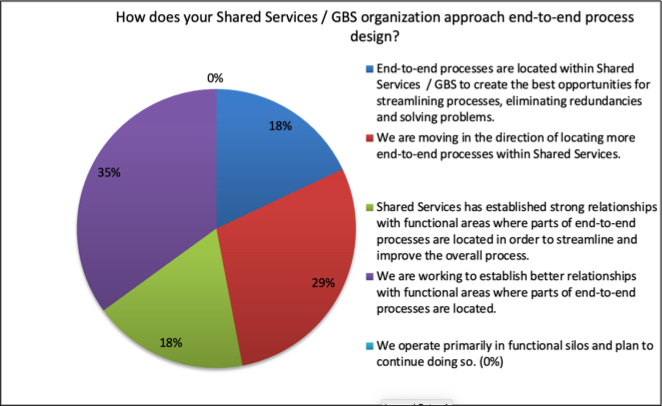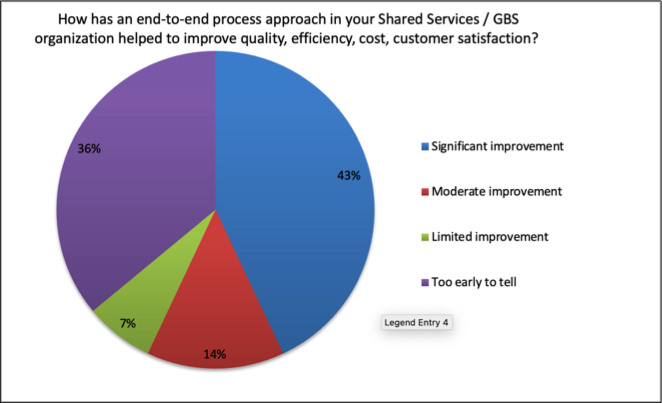The Impact of Shared Services / GBS on Functional Boundaries
Introduction
As companies continue to evolve their Shared Services models, in many cases functional boundaries are challenged, which can increase opportunities to leverage process change methods and new technologies by eliminating turf battles that are all too common between functions or departments. For many, the processes within scope are more strongly aligned with “Shared Services” or “Global Business Services” than with a functional area like “Finance” or “HR”.
This change can be revolutionary, in the same way, “reengineering” was revolutionary when Hammer and Champy published their book, Reengineering the Corporation, in 1993. Yet very few business leaders have done more than read the book and get inspired. The hard work of changing end-to-end processes can be a challenge that is seemingly impossible to overcome. Implementing Shared Services / GBS can be a powerful enabler, where creating more impactful results becomes a new possibility, with a higher probability for a true redesign of end-to-end processes at a detail level. However, there can also be new complexities introduced, as any change in identity creates unexpected challenges; for example, confusion for position scoping and career path planning which historically are completed within the structure of a functional area.
Company Experiences
A Peercast discussion in Peeriosity’s Shared Services Leadership research area featured a panel of leading companies discussing how Shared Services / GBS has had a positive impact on breaking down functional boundaries, and how they responded to the challenges that occurred as these changes happened.
For details, Peeriosity members are encouraged to sign into the members’ area to view the complete presentation and listen to the recorded Peercast.
iPolling Results Review
Peeriosity’s iPolling was used to provide insight into the impact that Shared Services / GBS has had on traditional functional boundaries. The first poll question asked about the impact that Shared Services / GBS has had on end-to-end process design. While the good news is that no Peeriosity member companies indicated that they operate in functional silos with expectations for that to continue, for 53% of respondents, although they do not currently have the complete end-to-end processes located in Shared Services / GBS, 18% have established strong relationships with the functional areas where parts of the end-to-end processes are located in order to streamline and improve the overall process and 35% are working to improve these relationships with partner functional areas. Of the remaining 47%, 18% indicated that end-to-end processes are located within Shared Services / GBS to create the best opportunities for streamlining processes, eliminating redundancies, and solving problems, with another 29% responding that they are moving in the direction of locating more end-to-end processes within Shared Services and will be able to build on what they have already done. Here are the details:

The second poll question asked about how having an end-to-end approach in the Shared Services / GBS organization has helped to improve quality, efficiency, cost, and customer satisfaction. The results are impressive, with 43% of Peeriosity member companies reporting a significant improvement, an additional 14% reporting moderate improvement and only 7% indicating they have seen limited improvement. However, many are still in the early stages, with 36% reporting that it is too early to tell.

Closing Summary
Impacting end-to-end process design has been a challenge for decades, with companies who have implemented Shared Services or Global Business Services having a clear advantage over companies who haven’t gone through the same transformation process. The impact increases the more Shared Services becomes Global Business Services with multi-functional designs that bend and, in some cases, eliminate traditional functional boundaries.
How does your Shared Services / GBS organization approach end-to-end process design? How has an end-to-end process approach in your Shared Services / GBS organization helped to improve quality, efficiency, cost, and customer satisfaction?
Who are your peers and how are you collaborating with them?
________________________________________________________________________________________________
“Peercasts” are private, professionally facilitated webcasts that feature leading member company experiences on specific topics as a catalyst for broader discussion. Access is available exclusively to Peeriosity member company employees, with consultants or vendors prohibited from attending or accessing discussion content. Members can see who is registered to attend in advance, with discussion recordings, supporting polls, and presentation materials online and available whenever convenient for the member. Using Peeriosity’s integrated email system, Peer MailTM, attendees can easily communicate at any time with other attending peers by selecting them from the list of registered attendees.
“iPolling” is available exclusively to Peeriosity member company employees, with consultants or vendors prohibited from participating or accessing content. Members have full visibility of all respondents and their comments. Using Peeriosity’s integrated email system, Peer Mail, members can easily communicate at any time with others who participated in iPolling.
Peeriosity members are invited to log into www.peeriosity.com to join the discussion and connect with Peers. Membership is for practitioners only, with no consultants or vendors permitted. To learn more about Peeriosity, click here.

